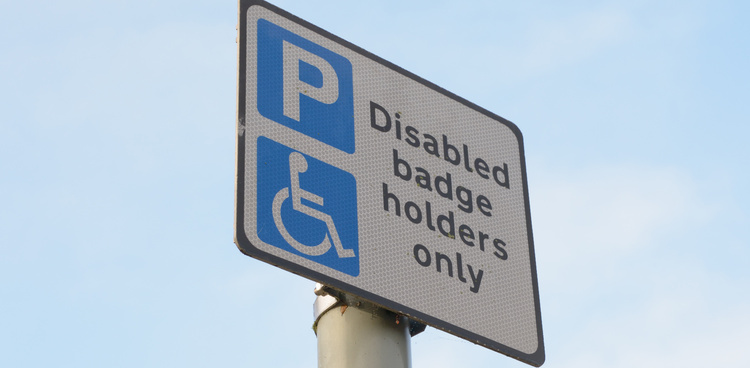
Handicap Placard vs. Handicap License Plates: Which is Right for You in Michigan?
Introduction
Living with a disability presents various challenges, and it's essential to have the right accommodations when navigating through daily life. In Michigan, individuals with disabilities have the option to obtain either a placard or license plates for their vehicles. But which option is better suited to your needs? In this article, we will explore the differences between handicap placards and handicap license plates in Michigan, their advantages, and how to choose the right one based on your specific circumstances.
Handicap Placard vs. Handicap License Plates: Understanding the Difference
Both placards and license plates serve the same purpose – they grant certain parking privileges to individuals with disabilities. However, they differ in their application and usage:
Handicap Placard
A placard is a removable sign that hangs from the rearview mirror of a vehicle when parking in designated parking spaces. It is easily transferable between vehicles, allowing the person with a disability to use it in multiple cars.
Handicap License Plates
License plates, on the other hand, replace the standard license plates on a vehicle. They have the international symbol of accessibility and allow the vehicle to park in designated spaces without the need for a separate placard.
Advantages of a Placard
Portability: The primary advantage of a handicap permit is its portability. Since it can be transferred between vehicles, it offers flexibility for individuals who frequently use different cars.
Privacy: Some people prefer using a permit as it does not draw unnecessary attention to their disability when the vehicle is not parked in a designated space.
Ease of Use: Hang the permit on the rearview mirror, and it is ready for use. There's no need to replace standard license plates or visit the Department of Motor Vehicles (DMV).
Short-Term Disability: Permits are ideal for individuals with temporary disabilities, such as those recovering from injuries or surgeries.
Advantages of License Plates
Permanent Fixture: Unlike a pass, license plates become a permanent fixture on the vehicle. There's no need to remember to display it whenever parking.
Avoid Misuse: Since license plates are directly associated with the vehicle, there's a reduced risk of unauthorized use or misuse compared to passes.
Durability: License plates are designed to withstand various weather conditions, ensuring they remain intact and visible at all times.
No Obstruction: With license plates, there is no concern about obstructing the driver's view or forgetting to remove it when driving.
Factors to Consider When Choosing
1. Type of Disability
The type and duration of the disability can influence the choice between a permit and license plates. Individuals with temporary disabilities may find a permit more suitable, while those with permanent disabilities may opt for license plates for long-term convenience.
2. Frequency of Vehicle Changes
If you frequently switch between vehicles, a permit offers the advantage of portability. However, if you primarily use one vehicle, license plates may be a more practical option.
3. Privacy Concerns
For those who value privacy, a permit may be preferred as it can be removed when not in use. License plates, being a permanent fixture, are always visible.
4. Risk of Misuse
Individuals concerned about unauthorized use of parking privileges may feel more secure with license plates, as they are directly tied to the vehicle.
5. Vehicle Ownership
If you do not own the vehicle but frequently use one (e.g., a company car or a friend's vehicle), a handicap placard that is transferable between cars might be more appropriate.
Handicap Placard vs. Handicap License Plates: Which Should You Choose in Michigan?
Deciding between a placard and license plates can be overwhelming. To help you make an informed decision, let's consider some common scenarios:
Scenario 1: Temporary Disability
If you have a temporary disability, such as a broken leg or recovery from surgery, a permit might be the best option. It can be easily transferred between vehicles and is valid for the duration of your temporary disability.
Scenario 2: Permanent Disability, One Vehicle
For individuals with a permanent disability who primarily use one vehicle, license plates provide a convenient and hassle-free solution. Once installed, you won't need to worry about displaying a permit every time you park.
Scenario 3: Permanent Disability, Multiple Vehicles
If you have a permanent disability but frequently use different vehicles, a permit is more practical. You can easily move it from one car to another, ensuring you always have the necessary parking accommodations.
Scenario 4: Privacy Concerns
Some individuals may prefer a permit if they are concerned about privacy and drawing attention to their disability when the vehicle is not parked in a designated space. With a permit, you can simply remove it when you don't need it.
Scenario 5: Avoiding Misuse
If you are worried about the misuse of parking privileges, license plates are a safer option since they are linked directly to the vehicle.
FAQs
FAQ 1: What is the application process for obtaining a pass or license plates in Michigan?
Answer: To apply for a pass or license plates in Michigan, you need to complete the appropriate application form available through the Michigan Secretary of State (SOS) website or local SOS branch. You may need to provide documentation from your healthcare professional certifying your disability.
FAQ 2: Can I use a pass or license plates in other states?
Answer: Yes, passes and license plates are generally recognized across all U.S. states. However, it's essential to follow the specific parking regulations and guidelines of each state.
FAQ 3: How long is a pass valid?
Answer: In Michigan, a pass is typically valid for passes is valid for up to four years. For temporary disabilities, it may be issued for a shorter duration.
FAQ 4: Can I transfer my license plates to another vehicle?
Answer: Yes, license plates can be transferred to another vehicle you own. However, you must notify the Michigan SOS of the transfer and provide the necessary documentation.
FAQ 5: Are passes and license plates free of charge?
Answer: The initial application for a placard or license plates may be free for individuals with qualifying disabilities. However, there may be a fee for replacement or renewal.
FAQ 6: Can I lend my pass to someone else?
Answer: No, passes are issued to individuals with disabilities for their personal use only. Lending your pass to someone else is a violation of parking regulations and may result in penalties.
Conclusion
In conclusion, the choice between a handicap placard and handicap license plates in Michigan depends on various factors, including the type and duration of disability, vehicle ownership, privacy concerns, and risk of misuse. Consider your unique circumstances and preferences before making a decision. Regardless of your choice, both options aim to provide individuals with disabilities the necessary parking accommodations for improved accessibility and convenience.
Remember, it's essential to comply with all parking regulations to ensure that the privileges granted by your chosen option are used responsibly and fairly.
.png)






